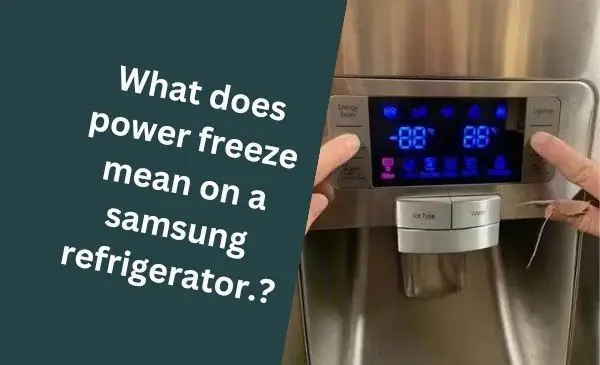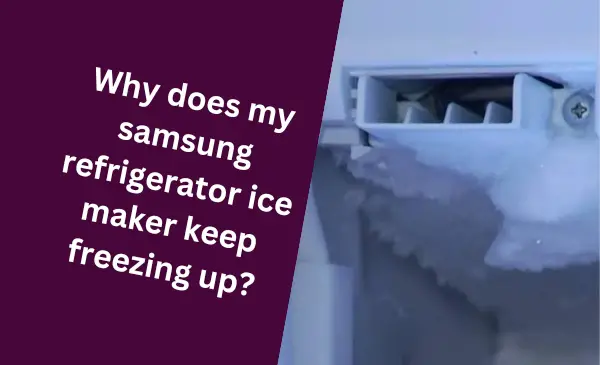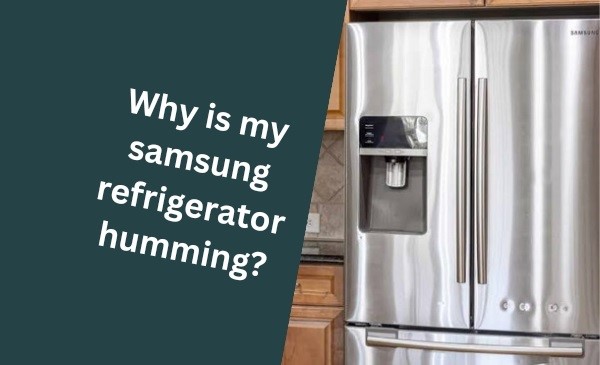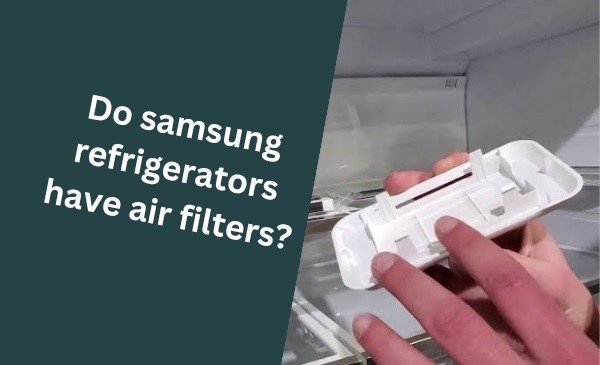If your Samsung refrigerator is making a loud noise, it is likely due to a faulty fan or a problem with the compressor. This noise can indicate a mechanical issue that needs to be addressed to avoid further damage or malfunctioning of the appliance.
In some cases, the noise might be caused by excessive ice buildup or a loose part, but it is essential to identify and fix the underlying problem to restore your refrigerator’s optimal performance and minimize any disruptions in your kitchen routine.
We will explore the possible reasons for your Samsung refrigerator making a loud noise and discuss the steps you can take to troubleshoot and resolve this issue.
Common Causes Of Loud Noise In Samsung Refrigerators
If you’ve noticed that your Samsung refrigerator is making a loud noise, it can be quite bothersome. Not only can it disrupt the peaceful ambiance of your home, but it may also be a sign of an underlying issue with the appliance. Understanding the common causes of these noises can help you identify the problem and address it in a timely manner.
Faulty Fan Motor
One possible culprit behind the loud noise in your Samsung refrigerator is a faulty fan motor. The fan motor is responsible for circulating the cool air throughout the unit, ensuring that all areas are evenly cooled. Over time, the fan motor may experience wear and tear or even become misaligned, resulting in a loud grinding or screeching noise. This can be quite disruptive, especially if the refrigerator is located near frequently used areas in your home.
Worn Out Compressor
Another common cause of loud noise in Samsung refrigerators is a worn-out compressor. The compressor plays a vital role in the refrigeration cycle by compressing the refrigerant and maintaining the desired temperature inside the appliance. However, over time, the compressor motor can become worn out or damaged, leading to vibrations and rattling noises.
If you notice this type of noise coming from your refrigerator, it is important to address it promptly to prevent further damage to the unit.
Damaged Evaporator Fan
The evaporator fan, located in the freezer compartment of your Samsung refrigerator, helps circulate the cold air from the evaporator coils throughout the refrigerator. If the evaporator fan becomes damaged or starts to malfunction, it can produce a loud buzzing or humming noise.
This noise may become particularly noticeable when you open the refrigerator door. In such cases, it is essential to repair or replace the damaged evaporator fan to restore the smooth operation and quietness of your refrigerator.
Clogged Or Faulty Condenser Fan
The condenser fan, located near the compressor, plays a crucial role in removing heat from the refrigerator and releasing it into the surrounding environment. If the condenser fan becomes clogged with dust or debris, it can obstruct the airflow and create a loud rattling or buzzing noise.
Additionally, the condenser fan motor may also experience issues, such as worn-out bearings or misalignment, leading to unusual noises. Checking and cleaning the condenser fan regularly can help prevent such problems and ensure your refrigerator operates quietly and efficiently.
In addition, if your Samsung refrigerator is making a loud noise, it’s important to address the issue promptly to avoid further damage and inconvenience. The common causes of these noises include a faulty fan motor, a worn-out compressor, a damaged evaporator fan, and a clogged or faulty condenser fan. By identifying the source of the noise, you can take the necessary steps to resolve the problem and restore the tranquility in your home.
Troubleshooting And Quick Fixes For Samsung Refrigerator Noise Issues
When it comes to a loud noise coming from your Samsung refrigerator, troubleshooting the issue and finding quick fixes can help resolve the problem without the need for professional intervention. Here are some common noise issues that you may encounter with your Samsung refrigerator and the steps you can take to address them.
Cleaning And Removing Debris From Fans And Vents
If your Samsung refrigerator is making a loud noise, the first thing you should check is the fans and vents. Over time, dirt, dust, and debris can accumulate, obstructing the smooth operation of the fans and causing them to make noise. Follow these steps to clean and remove debris from the fans and vents:
- Unplug your refrigerator from the power source to ensure your safety.
- Locate the fans and vents. Refer to the manufacturer’s manual if you’re unsure.
- Carefully clean the fans and vents using a soft brush or vacuum cleaner to remove any dirt or debris.
- Ensure that the fans and vents are free from obstructions and can rotate freely.
- Plug your refrigerator back in and check if the noise has subsided.
Checking And Replacing Faulty Fan Motor
A faulty fan motor can also cause your Samsung refrigerator to make loud noises. Here’s how you can check and replace a faulty fan motor:
- Disconnect the power supply to your refrigerator.
- Locate the fan motor. It is usually located at the back of the refrigerator, near the evaporator coil or condenser.
- Inspect the fan motor for any signs of damage, such as frayed wires or a burnt smell.
- If the fan motor is damaged or malfunctioning, replace it with a new one. Refer to the manufacturer’s manual for specific instructions.
- After replacing the fan motor, reconnect the power supply and check if the noise issue has been resolved.
Testing And Replacing A Worn Out Compressor
The compressor is an essential component of your Samsung refrigerator, and if it becomes worn out, it can result in loud noises. Follow these steps to test and replace a worn-out compressor:
- Turn off and unplug your refrigerator.
- Locate the compressor, which is usually at the back of the refrigerator.
- Using a multimeter, test the compressor for continuity. If the multimeter reading indicates no continuity, the compressor may be faulty.
- If the compressor is worn out or malfunctioning, it will need to be replaced. It is recommended to contact a professional technician for this repair.
Repairing Or Replacing Damaged Evaporator Fan
If the noise is coming from the freezer compartment, it could be due to a damaged evaporator fan. To repair or replace a damaged evaporator fan:
- Ensure that your refrigerator is unplugged before starting any repairs.
- Locate the evaporator fan, which is usually located behind the back panel of the freezer compartment.
- Inspect the fan for any damage or obstruction. Clean or replace the fan if necessary.
- After repairing or replacing the evaporator fan, plug in your refrigerator and check if the noise problem has been resolved.
Clearing Blockages In The Condenser Fan
The condenser fan in your Samsung refrigerator helps dissipate heat, and if it is obstructed, it can cause noise issues. Follow these steps to clear blockages in the condenser fan:
- Disconnect the power supply to your refrigerator.
- Locate the condenser fan, which is typically located on the back of the refrigerator, near the bottom.
- Inspect the fan for any debris or blockages. Carefully remove any obstructions.
- Verify that the fan can rotate freely.
- Plug your refrigerator back in and check if the noise has been resolved.
Steps To Properly Maintain Your Samsung Refrigerator For Noise Prevention
Regular Cleaning And Maintenance
One of the most effective ways to prevent loud noises from coming from your Samsung refrigerator is to maintain a regular cleaning and maintenance routine. By keeping your refrigerator clean, you can ensure that the components are working optimally, reducing the chances of any noises occurring.
Here are a few cleaning and maintenance tips:
- Clean the condenser coils: Over time, dust and debris can accumulate on the condenser coils, affecting their performance and causing the refrigerator to work harder. To clean the coils, first, unplug the refrigerator and locate them at the back or underneath the unit. Use a brush or a vacuum cleaner to remove the dust gently.
- Check the evaporator fan: The evaporator fan is responsible for circulating cool air throughout the refrigerator. If it becomes dirty or clogged, it may start making loud noises. Check the fan for any obstructions and clean it using a soft brush or cloth regularly.
- Defrost the freezer: If your refrigerator has a built-in freezer, it’s important to defrost it regularly. Ice buildup can cause the fan to grind against it, producing loud noises. Follow the manufacturer’s instructions to defrost your freezer properly.
Proper Placement And Ventilation
The placement and ventilation of your Samsung refrigerator can significantly impact its noise levels. Proper positioning and adequate airflow are essential for a well-functioning refrigerator.
Consider the following tips:
- Choose a level surface: Place your refrigerator on a level surface to ensure its stability and prevent any vibrations that may contribute to noise.
- Allow sufficient space around the refrigerator: Make sure there is enough space around the refrigerator for proper airflow. Maintain a minimum distance of at least 2-3 inches between the refrigerator and the wall or surrounding cabinets.
- Keep the vents clear: Inspect the vents located at the back or underneath the refrigerator regularly. Ensure they are not blocked by any objects or dust, as this can impede the circulation of air and lead to increased noise levels.
Monitoring And Replacing Worn Out Parts
As your Samsung refrigerator ages, certain components may start to wear out, leading to loud and disruptive noises. By monitoring these parts and replacing them when necessary, you can maintain a quieter refrigerator.
Here are some key parts to keep an eye on:
- The evaporator fan motor: This motor circulates cool air within the refrigerator. If it starts malfunctioning or becoming noisy, consider replacing it.
- Compressor and condenser fan motor: The compressor and condenser fan motor work together to cool the refrigerator. If you hear unusual noises coming from these components, it may be time for a replacement.
- Gaskets and seals: Faulty gaskets or seals on the doors can result in increased noise levels as the refrigerator struggles to maintain a consistent temperature. Replace any worn-out gaskets to minimize noise and improve energy efficiency.
Regularly monitor these parts and consult your refrigerator’s user manual or contact a professional technician if you notice any unusual noises or signs of wear and tear.
With these steps, you can ensure that your Samsung refrigerator operates quietly and efficiently. By regularly cleaning and maintaining your refrigerator, providing proper placement and ventilation, and monitoring and replacing worn-out parts, you can enjoy a peaceful environment in your kitchen while keeping your food fresh and cool.
When Is It Time To Call For Professional Help For Your Samsung Refrigerator Noise?
While troubleshooting steps can help resolve some minor issues with your Samsung refrigerator noise, there are instances when professional help becomes necessary. Identifying the right time to reach out to a qualified technician can save valuable time and prevent further damage to your appliance. Below are three key situations when it’s time to consider calling for professional assistance:
Persistent Loud Noise Despite Troubleshooting Steps
If you’ve followed the troubleshooting steps recommended by Samsung and the loud noise from your refrigerator persists, it’s time to call in the experts. While some noises are normal, such as the humming of the compressor or the occasional clicking sound, persistent loud noises can indicate a more serious problem.
These noises could be due to faulty components, loose parts, or internal damage that require professional expertise to diagnose and fix. A trained technician will have the knowledge and tools to investigate the source of the noise and provide a precise solution.
Complex Repairs And Replacements
Some refrigerator issues may require complex repairs or replacements, which are best left in the hands of professionals. For instance, if the noise is caused by a malfunctioning motor or a damaged fan blade, these components may need to be replaced. Attempting such repairs without proper training can not only be dangerous but may also lead to further damage.
Hiring a professional ensures that the necessary repairs or replacements are done correctly, minimizing the risk of additional problems and extending the lifespan of your Samsung refrigerator.
Warranty Coverage
If your Samsung refrigerator is still within the warranty period, calling for professional help is highly recommended. Attempting to repair the appliance yourself or seeking assistance from unauthorized technicians can void the warranty, leaving you responsible for the costs associated with any repairs or replacements.
By contacting Samsung or their authorized service centers, you can ensure that any necessary repairs are covered by the warranty. Trained technicians can also provide advice on maintenance and preventive measures to prolong the lifespan of your refrigerator.
Remember, when it comes to addressing loud noises from your Samsung refrigerator, seeking professional help in the right situations is crucial. Persistent noise despite your troubleshooting efforts, the need for complex repairs or replacements, and warranty coverage are all valid reasons to reach out to qualified technicians.
By doing so, you can have peace of mind knowing that your appliance is in capable hands and that the noise issue will be resolved effectively.
Preventive Measures To Reduce Samsung Refrigerator Noise In The Long Run
While dealing with a loud refrigerator noise can be frustrating, there are preventive measures you can take to reduce the noise in the long run. Implementing these measures will not only help you enjoy a quieter and more peaceful kitchen environment, but also extend the lifespan of your Samsung refrigerator. Here are three key preventive measures you can follow:
Regular Cleaning And Maintenance Schedule
Maintaining a regular cleaning and maintenance schedule is crucial to minimize noise issues in your Samsung refrigerator. Dust, dirt, and debris can accumulate over time, leading to inefficient performance and increased noise levels. To prevent this, make sure to clean the refrigerator coils, condenser fan, and vents on a regular basis. This will ensure proper airflow and cooling, reducing the strain on the refrigerator’s components and minimizing noise.
Additionally, regularly check and clean the door seals to ensure a tight seal and optimal insulation. A clean and well-maintained refrigerator not only operates quietly but also helps save energy.
Paying Attention To Unusual Sounds
Paying attention to unusual sounds coming from your Samsung refrigerator is essential in identifying potential issues before they escalate. While refrigerators do make some noise during normal operation, loud or unusual sounds could be a sign of a problem. If you notice any knocking, banging, grinding, or rattling noises, it’s important to investigate the cause and address it promptly. These sounds could indicate issues with the compressor, motor, fan, or other components.
By taking immediate action, you can prevent further damage and costly repairs down the line, ensuring your refrigerator continues to operate quietly.
Promptly Addressing Any Emerging Issues
When it comes to dealing with refrigerator noise, addressing any emerging issues promptly is crucial. If you notice an increase in noise levels or any other performance issues, don’t ignore them. Often, early intervention can prevent minor problems from becoming major ones. If you’re unsure about the cause or how to address the issue, it’s best to consult the manufacturer’s manual or contact a qualified technician. They can provide expert guidance and help resolve the problem efficiently.
Addressing emerging issues promptly not only helps reduce noise but also prevents potential disruptions to your daily routine.
Credit: www.amazon.com
Frequently Asked Questions Of Why Is My Samsung Refrigerator Making A Loud Noise
Why Is My Samsung Refrigerator Making A Loud Noise?
There are several possible reasons why your Samsung refrigerator is making a loud noise. It could be due to a faulty condenser fan motor, a malfunctioning evaporator fan motor, or a problem with the compressor. Additionally, a clogged or malfunctioning defrost drain can also cause loud noises.
It’s best to contact a professional technician to diagnose and fix the issue.
How Can I Reduce The Noise Coming From My Samsung Refrigerator?
To reduce the noise coming from your Samsung refrigerator, you can try a few things. First, ensure that the refrigerator is level and stable on the floor. Tighten any loose screws or bolts that may be causing vibrations. Check if there are any items on top of or next to the refrigerator that could be causing the noise.
If the noise persists, it’s recommended to contact a professional technician for further examination.
Is It Normal For A Samsung Refrigerator To Make Noise?
It is normal for a Samsung refrigerator to make some noise during normal operation. For example, you may hear the refrigerator running, the condenser fan motor spinning, or the ice maker filling with water. However, if the noise is excessively loud or unusual, it may indicate a problem that requires professional attention.
How Long Should A Samsung Refrigerator Run Quietly?
A Samsung refrigerator should typically run quietly for the majority of its operating time. However, it’s normal to hear the refrigerator running periodically as it maintains proper interior temperature. If you notice a sudden increase in noise or if the refrigerator is making loud noises constantly, it’s recommended to seek professional assistance.
Conclusion
A loud noise coming from your Samsung refrigerator can be concerning and disruptive. It is important to identify the cause of the noise to prevent further damage and ensure the efficient operation of your appliance. By checking the condenser fan motor, evaporator fan motor, and compressor, you can address the issue and potentially avoid costly repairs or replacements.
Regular maintenance and prompt attention to any strange noises will help keep your refrigerator running smoothly and quietly for years to come.
Hello Readers, I am Mechanic Shuvo, a seasoned refrigerator solution expert with over 11 years of hands-on experience in the field. Throughout my career, I've dedicated myself to understanding the ins and outs of refrigeration systems, honing my skills as a refrigerator mechanic. My passion for these appliances led me to create the website "refrigeratorsolutionsguide.com," where I aim to share my wealth of knowledge and expertise with others.
Over the years, I've encountered a wide range of refrigerator issues and have successfully resolved them all. From common problems like temperature fluctuations and strange noises to more complex technical issues, I've seen it all. Through my website, I hope to provide practical solutions, insightful tips, and guidance to help you keep your refrigerators running smoothly.






